LAW504 - Corporations Law Case Study: Peter Jones' Remedies
VerifiedAdded on 2022/09/14
|7
|1827
|29
Case Study
AI Summary
This case study analyzes the legal issues arising from a scenario involving Peter Jones, a 5% shareholder of Sparkles Pty Ltd, a company dealing in custom jewellery. The case revolves around three complaints made by Peter to the company secretary. These complaints involve the sale of a rare sapphire stone by the CEO, Roger, to his nephew at a significantly undervalued price, a second director, Irma, intending to misuse company funds to purchase a lounge suit, and the alteration of the annual general meeting's venue. The analysis focuses on the breach of director's duties as per the Corporations Act 2001 (Cth), particularly sections 180, 181, and 182, and the potential remedies available to Peter Jones under section 232, considering the oppressive conduct. The document examines relevant case laws to support the arguments. The analysis concludes that Peter can seek remedies through the court under section 232 of CA.
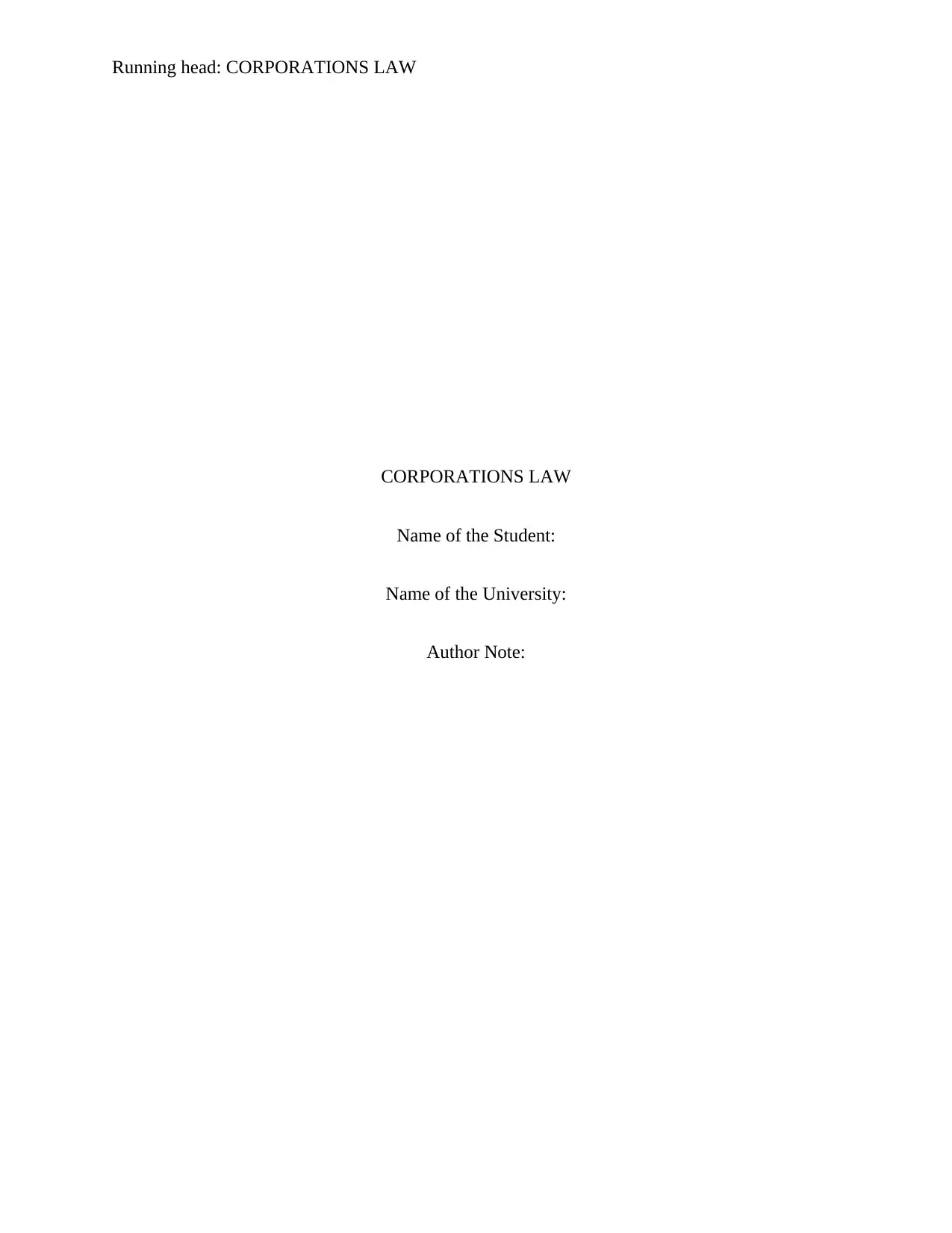
Running head: CORPORATIONS LAW
CORPORATIONS LAW
Name of the Student:
Name of the University:
Author Note:
CORPORATIONS LAW
Name of the Student:
Name of the University:
Author Note:
Paraphrase This Document
Need a fresh take? Get an instant paraphrase of this document with our AI Paraphraser
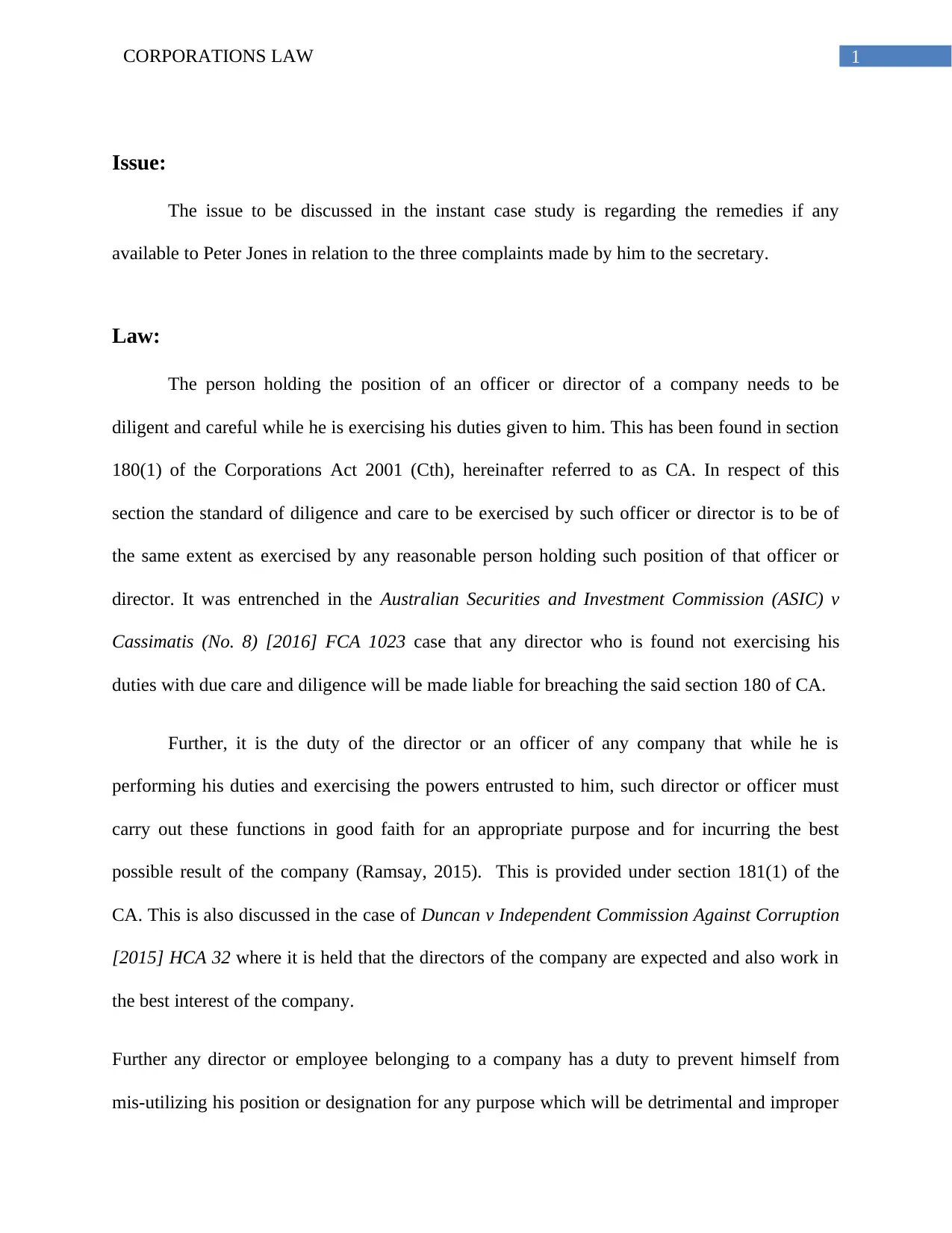
1CORPORATIONS LAW
Issue:
The issue to be discussed in the instant case study is regarding the remedies if any
available to Peter Jones in relation to the three complaints made by him to the secretary.
Law:
The person holding the position of an officer or director of a company needs to be
diligent and careful while he is exercising his duties given to him. This has been found in section
180(1) of the Corporations Act 2001 (Cth), hereinafter referred to as CA. In respect of this
section the standard of diligence and care to be exercised by such officer or director is to be of
the same extent as exercised by any reasonable person holding such position of that officer or
director. It was entrenched in the Australian Securities and Investment Commission (ASIC) v
Cassimatis (No. 8) [2016] FCA 1023 case that any director who is found not exercising his
duties with due care and diligence will be made liable for breaching the said section 180 of CA.
Further, it is the duty of the director or an officer of any company that while he is
performing his duties and exercising the powers entrusted to him, such director or officer must
carry out these functions in good faith for an appropriate purpose and for incurring the best
possible result of the company (Ramsay, 2015). This is provided under section 181(1) of the
CA. This is also discussed in the case of Duncan v Independent Commission Against Corruption
[2015] HCA 32 where it is held that the directors of the company are expected and also work in
the best interest of the company.
Further any director or employee belonging to a company has a duty to prevent himself from
mis-utilizing his position or designation for any purpose which will be detrimental and improper
Issue:
The issue to be discussed in the instant case study is regarding the remedies if any
available to Peter Jones in relation to the three complaints made by him to the secretary.
Law:
The person holding the position of an officer or director of a company needs to be
diligent and careful while he is exercising his duties given to him. This has been found in section
180(1) of the Corporations Act 2001 (Cth), hereinafter referred to as CA. In respect of this
section the standard of diligence and care to be exercised by such officer or director is to be of
the same extent as exercised by any reasonable person holding such position of that officer or
director. It was entrenched in the Australian Securities and Investment Commission (ASIC) v
Cassimatis (No. 8) [2016] FCA 1023 case that any director who is found not exercising his
duties with due care and diligence will be made liable for breaching the said section 180 of CA.
Further, it is the duty of the director or an officer of any company that while he is
performing his duties and exercising the powers entrusted to him, such director or officer must
carry out these functions in good faith for an appropriate purpose and for incurring the best
possible result of the company (Ramsay, 2015). This is provided under section 181(1) of the
CA. This is also discussed in the case of Duncan v Independent Commission Against Corruption
[2015] HCA 32 where it is held that the directors of the company are expected and also work in
the best interest of the company.
Further any director or employee belonging to a company has a duty to prevent himself from
mis-utilizing his position or designation for any purpose which will be detrimental and improper
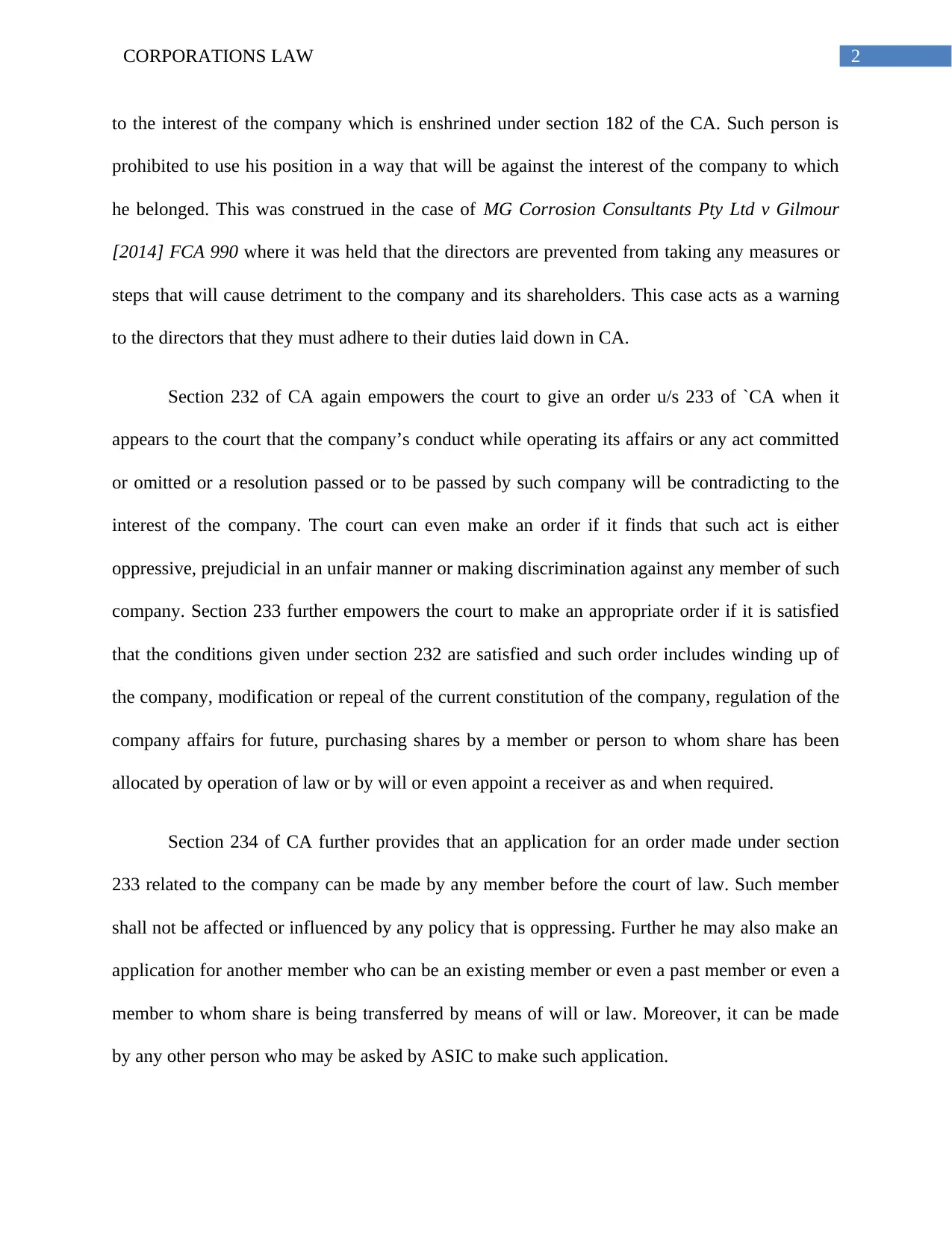
2CORPORATIONS LAW
to the interest of the company which is enshrined under section 182 of the CA. Such person is
prohibited to use his position in a way that will be against the interest of the company to which
he belonged. This was construed in the case of MG Corrosion Consultants Pty Ltd v Gilmour
[2014] FCA 990 where it was held that the directors are prevented from taking any measures or
steps that will cause detriment to the company and its shareholders. This case acts as a warning
to the directors that they must adhere to their duties laid down in CA.
Section 232 of CA again empowers the court to give an order u/s 233 of `CA when it
appears to the court that the company’s conduct while operating its affairs or any act committed
or omitted or a resolution passed or to be passed by such company will be contradicting to the
interest of the company. The court can even make an order if it finds that such act is either
oppressive, prejudicial in an unfair manner or making discrimination against any member of such
company. Section 233 further empowers the court to make an appropriate order if it is satisfied
that the conditions given under section 232 are satisfied and such order includes winding up of
the company, modification or repeal of the current constitution of the company, regulation of the
company affairs for future, purchasing shares by a member or person to whom share has been
allocated by operation of law or by will or even appoint a receiver as and when required.
Section 234 of CA further provides that an application for an order made under section
233 related to the company can be made by any member before the court of law. Such member
shall not be affected or influenced by any policy that is oppressing. Further he may also make an
application for another member who can be an existing member or even a past member or even a
member to whom share is being transferred by means of will or law. Moreover, it can be made
by any other person who may be asked by ASIC to make such application.
to the interest of the company which is enshrined under section 182 of the CA. Such person is
prohibited to use his position in a way that will be against the interest of the company to which
he belonged. This was construed in the case of MG Corrosion Consultants Pty Ltd v Gilmour
[2014] FCA 990 where it was held that the directors are prevented from taking any measures or
steps that will cause detriment to the company and its shareholders. This case acts as a warning
to the directors that they must adhere to their duties laid down in CA.
Section 232 of CA again empowers the court to give an order u/s 233 of `CA when it
appears to the court that the company’s conduct while operating its affairs or any act committed
or omitted or a resolution passed or to be passed by such company will be contradicting to the
interest of the company. The court can even make an order if it finds that such act is either
oppressive, prejudicial in an unfair manner or making discrimination against any member of such
company. Section 233 further empowers the court to make an appropriate order if it is satisfied
that the conditions given under section 232 are satisfied and such order includes winding up of
the company, modification or repeal of the current constitution of the company, regulation of the
company affairs for future, purchasing shares by a member or person to whom share has been
allocated by operation of law or by will or even appoint a receiver as and when required.
Section 234 of CA further provides that an application for an order made under section
233 related to the company can be made by any member before the court of law. Such member
shall not be affected or influenced by any policy that is oppressing. Further he may also make an
application for another member who can be an existing member or even a past member or even a
member to whom share is being transferred by means of will or law. Moreover, it can be made
by any other person who may be asked by ASIC to make such application.
⊘ This is a preview!⊘
Do you want full access?
Subscribe today to unlock all pages.

Trusted by 1+ million students worldwide
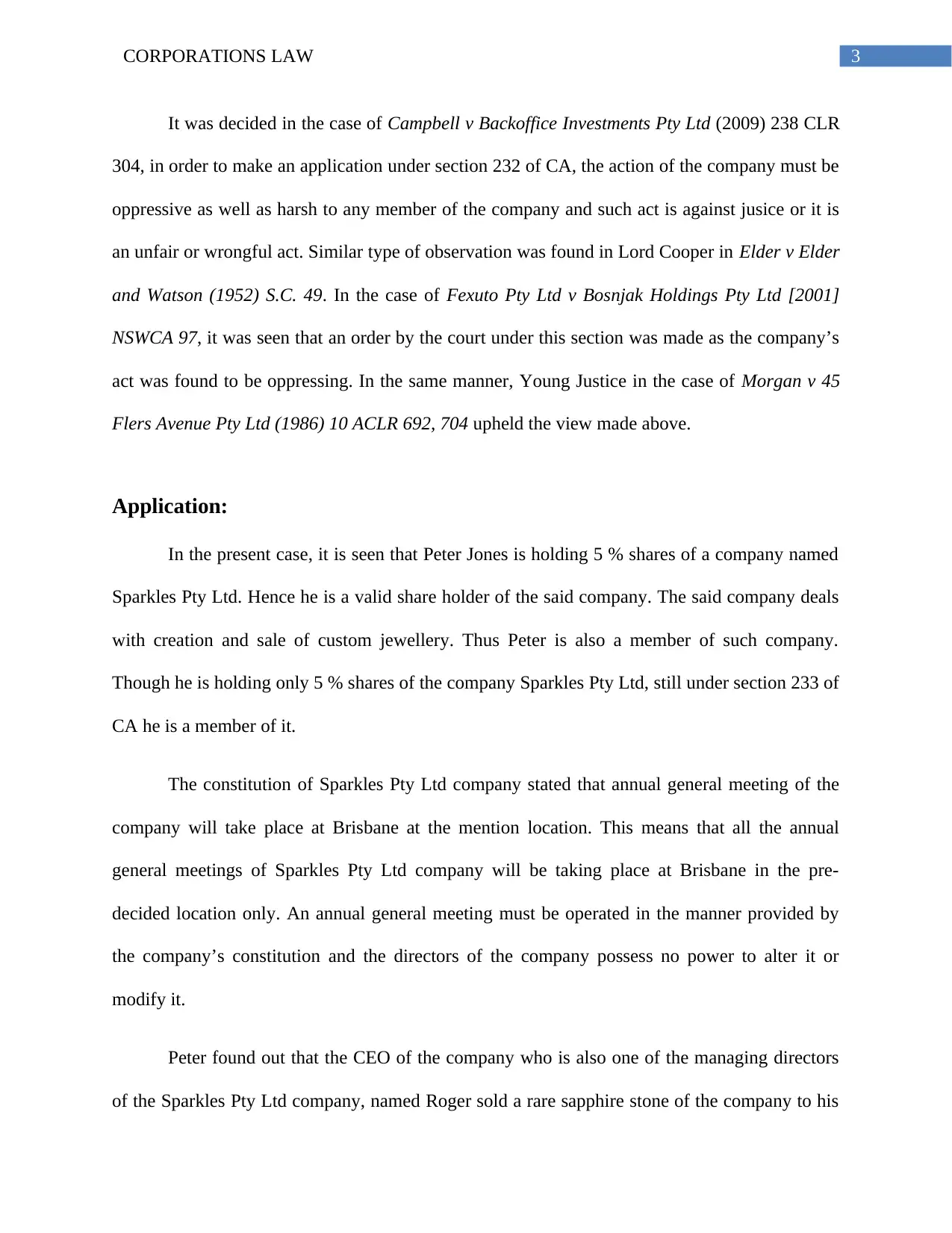
3CORPORATIONS LAW
It was decided in the case of Campbell v Backoffice Investments Pty Ltd (2009) 238 CLR
304, in order to make an application under section 232 of CA, the action of the company must be
oppressive as well as harsh to any member of the company and such act is against jusice or it is
an unfair or wrongful act. Similar type of observation was found in Lord Cooper in Elder v Elder
and Watson (1952) S.C. 49. In the case of Fexuto Pty Ltd v Bosnjak Holdings Pty Ltd [2001]
NSWCA 97, it was seen that an order by the court under this section was made as the company’s
act was found to be oppressing. In the same manner, Young Justice in the case of Morgan v 45
Flers Avenue Pty Ltd (1986) 10 ACLR 692, 704 upheld the view made above.
Application:
In the present case, it is seen that Peter Jones is holding 5 % shares of a company named
Sparkles Pty Ltd. Hence he is a valid share holder of the said company. The said company deals
with creation and sale of custom jewellery. Thus Peter is also a member of such company.
Though he is holding only 5 % shares of the company Sparkles Pty Ltd, still under section 233 of
CA he is a member of it.
The constitution of Sparkles Pty Ltd company stated that annual general meeting of the
company will take place at Brisbane at the mention location. This means that all the annual
general meetings of Sparkles Pty Ltd company will be taking place at Brisbane in the pre-
decided location only. An annual general meeting must be operated in the manner provided by
the company’s constitution and the directors of the company possess no power to alter it or
modify it.
Peter found out that the CEO of the company who is also one of the managing directors
of the Sparkles Pty Ltd company, named Roger sold a rare sapphire stone of the company to his
It was decided in the case of Campbell v Backoffice Investments Pty Ltd (2009) 238 CLR
304, in order to make an application under section 232 of CA, the action of the company must be
oppressive as well as harsh to any member of the company and such act is against jusice or it is
an unfair or wrongful act. Similar type of observation was found in Lord Cooper in Elder v Elder
and Watson (1952) S.C. 49. In the case of Fexuto Pty Ltd v Bosnjak Holdings Pty Ltd [2001]
NSWCA 97, it was seen that an order by the court under this section was made as the company’s
act was found to be oppressing. In the same manner, Young Justice in the case of Morgan v 45
Flers Avenue Pty Ltd (1986) 10 ACLR 692, 704 upheld the view made above.
Application:
In the present case, it is seen that Peter Jones is holding 5 % shares of a company named
Sparkles Pty Ltd. Hence he is a valid share holder of the said company. The said company deals
with creation and sale of custom jewellery. Thus Peter is also a member of such company.
Though he is holding only 5 % shares of the company Sparkles Pty Ltd, still under section 233 of
CA he is a member of it.
The constitution of Sparkles Pty Ltd company stated that annual general meeting of the
company will take place at Brisbane at the mention location. This means that all the annual
general meetings of Sparkles Pty Ltd company will be taking place at Brisbane in the pre-
decided location only. An annual general meeting must be operated in the manner provided by
the company’s constitution and the directors of the company possess no power to alter it or
modify it.
Peter found out that the CEO of the company who is also one of the managing directors
of the Sparkles Pty Ltd company, named Roger sold a rare sapphire stone of the company to his
Paraphrase This Document
Need a fresh take? Get an instant paraphrase of this document with our AI Paraphraser
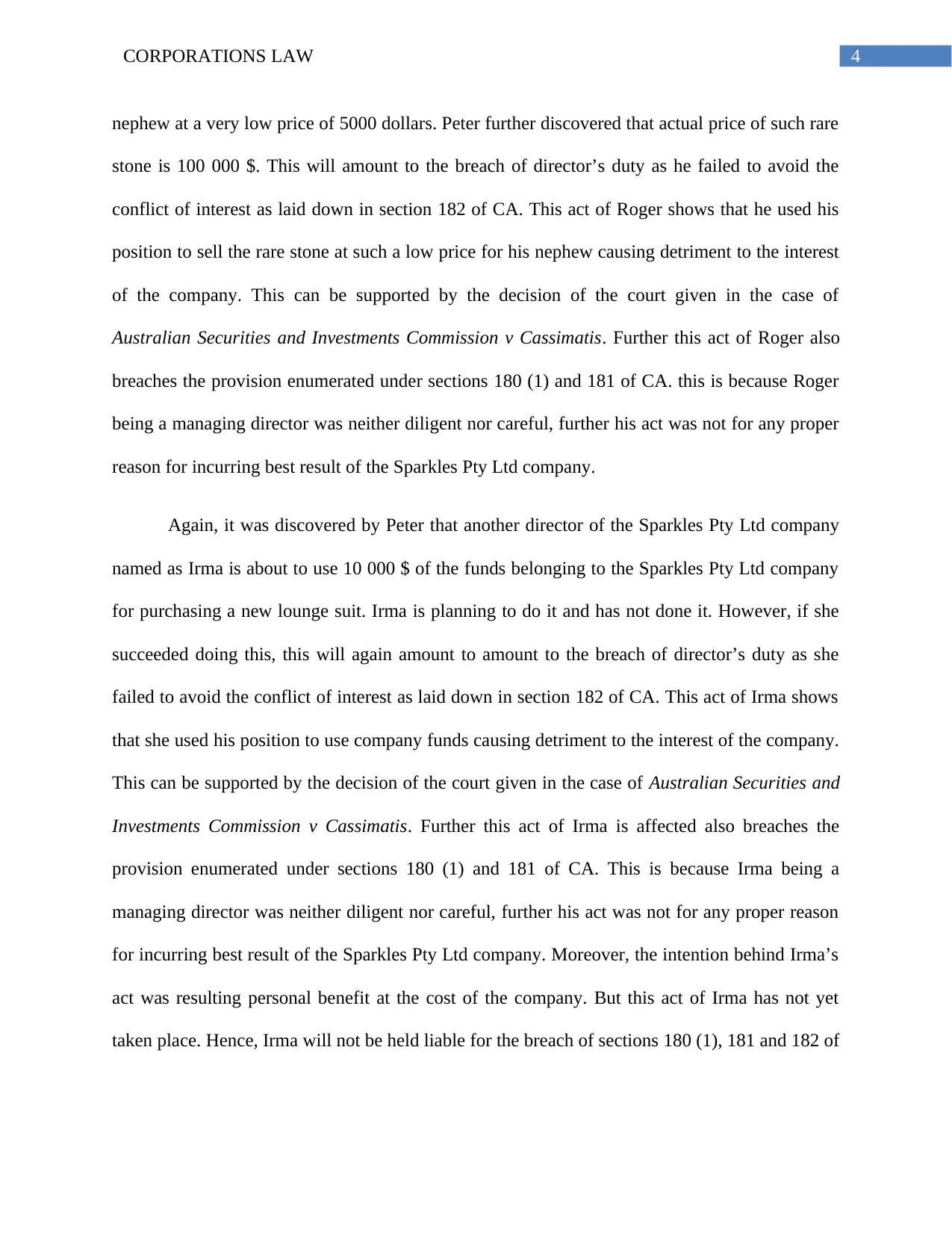
4CORPORATIONS LAW
nephew at a very low price of 5000 dollars. Peter further discovered that actual price of such rare
stone is 100 000 $. This will amount to the breach of director’s duty as he failed to avoid the
conflict of interest as laid down in section 182 of CA. This act of Roger shows that he used his
position to sell the rare stone at such a low price for his nephew causing detriment to the interest
of the company. This can be supported by the decision of the court given in the case of
Australian Securities and Investments Commission v Cassimatis. Further this act of Roger also
breaches the provision enumerated under sections 180 (1) and 181 of CA. this is because Roger
being a managing director was neither diligent nor careful, further his act was not for any proper
reason for incurring best result of the Sparkles Pty Ltd company.
Again, it was discovered by Peter that another director of the Sparkles Pty Ltd company
named as Irma is about to use 10 000 $ of the funds belonging to the Sparkles Pty Ltd company
for purchasing a new lounge suit. Irma is planning to do it and has not done it. However, if she
succeeded doing this, this will again amount to amount to the breach of director’s duty as she
failed to avoid the conflict of interest as laid down in section 182 of CA. This act of Irma shows
that she used his position to use company funds causing detriment to the interest of the company.
This can be supported by the decision of the court given in the case of Australian Securities and
Investments Commission v Cassimatis. Further this act of Irma is affected also breaches the
provision enumerated under sections 180 (1) and 181 of CA. This is because Irma being a
managing director was neither diligent nor careful, further his act was not for any proper reason
for incurring best result of the Sparkles Pty Ltd company. Moreover, the intention behind Irma’s
act was resulting personal benefit at the cost of the company. But this act of Irma has not yet
taken place. Hence, Irma will not be held liable for the breach of sections 180 (1), 181 and 182 of
nephew at a very low price of 5000 dollars. Peter further discovered that actual price of such rare
stone is 100 000 $. This will amount to the breach of director’s duty as he failed to avoid the
conflict of interest as laid down in section 182 of CA. This act of Roger shows that he used his
position to sell the rare stone at such a low price for his nephew causing detriment to the interest
of the company. This can be supported by the decision of the court given in the case of
Australian Securities and Investments Commission v Cassimatis. Further this act of Roger also
breaches the provision enumerated under sections 180 (1) and 181 of CA. this is because Roger
being a managing director was neither diligent nor careful, further his act was not for any proper
reason for incurring best result of the Sparkles Pty Ltd company.
Again, it was discovered by Peter that another director of the Sparkles Pty Ltd company
named as Irma is about to use 10 000 $ of the funds belonging to the Sparkles Pty Ltd company
for purchasing a new lounge suit. Irma is planning to do it and has not done it. However, if she
succeeded doing this, this will again amount to amount to the breach of director’s duty as she
failed to avoid the conflict of interest as laid down in section 182 of CA. This act of Irma shows
that she used his position to use company funds causing detriment to the interest of the company.
This can be supported by the decision of the court given in the case of Australian Securities and
Investments Commission v Cassimatis. Further this act of Irma is affected also breaches the
provision enumerated under sections 180 (1) and 181 of CA. This is because Irma being a
managing director was neither diligent nor careful, further his act was not for any proper reason
for incurring best result of the Sparkles Pty Ltd company. Moreover, the intention behind Irma’s
act was resulting personal benefit at the cost of the company. But this act of Irma has not yet
taken place. Hence, Irma will not be held liable for the breach of sections 180 (1), 181 and 182 of
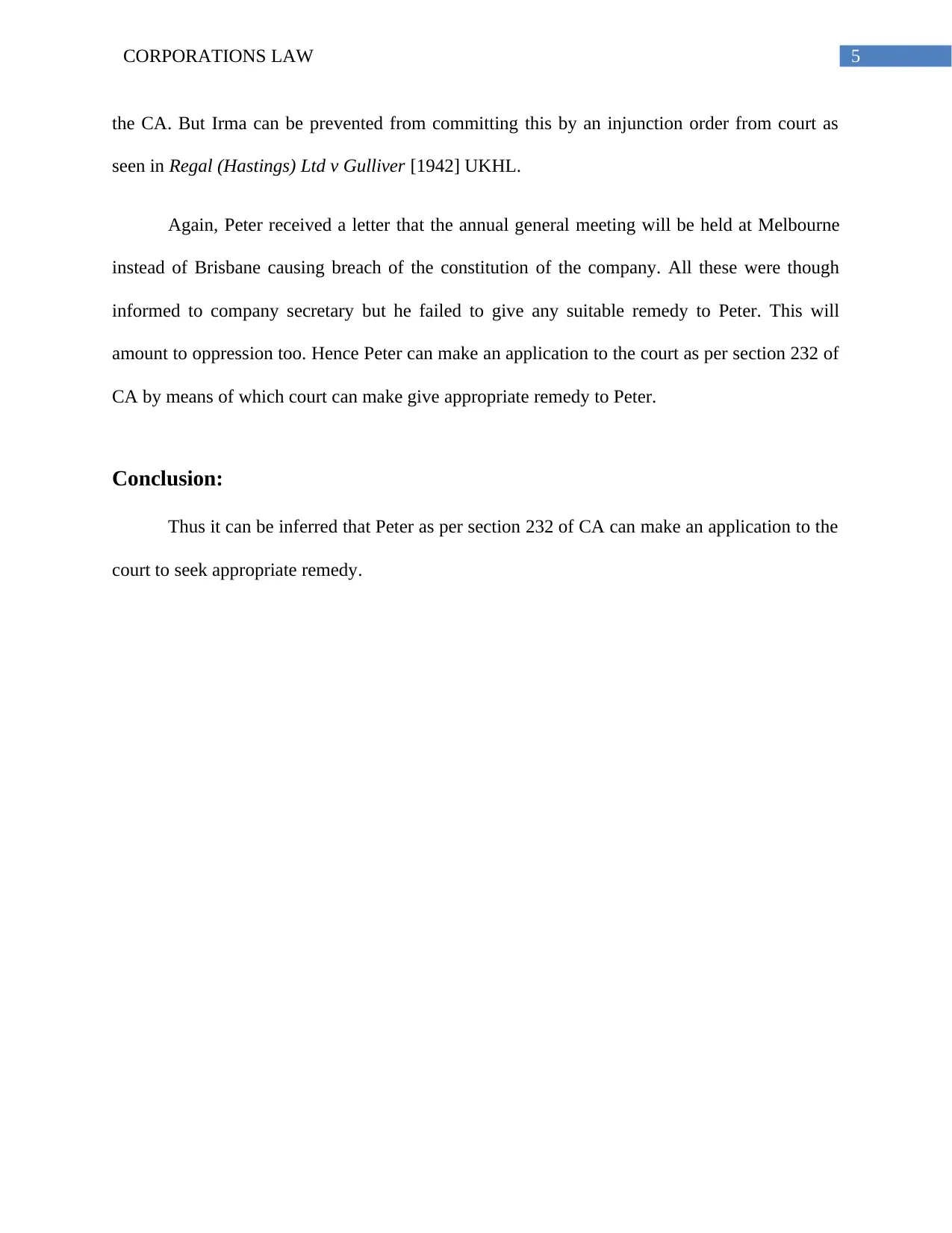
5CORPORATIONS LAW
the CA. But Irma can be prevented from committing this by an injunction order from court as
seen in Regal (Hastings) Ltd v Gulliver [1942] UKHL.
Again, Peter received a letter that the annual general meeting will be held at Melbourne
instead of Brisbane causing breach of the constitution of the company. All these were though
informed to company secretary but he failed to give any suitable remedy to Peter. This will
amount to oppression too. Hence Peter can make an application to the court as per section 232 of
CA by means of which court can make give appropriate remedy to Peter.
Conclusion:
Thus it can be inferred that Peter as per section 232 of CA can make an application to the
court to seek appropriate remedy.
the CA. But Irma can be prevented from committing this by an injunction order from court as
seen in Regal (Hastings) Ltd v Gulliver [1942] UKHL.
Again, Peter received a letter that the annual general meeting will be held at Melbourne
instead of Brisbane causing breach of the constitution of the company. All these were though
informed to company secretary but he failed to give any suitable remedy to Peter. This will
amount to oppression too. Hence Peter can make an application to the court as per section 232 of
CA by means of which court can make give appropriate remedy to Peter.
Conclusion:
Thus it can be inferred that Peter as per section 232 of CA can make an application to the
court to seek appropriate remedy.
⊘ This is a preview!⊘
Do you want full access?
Subscribe today to unlock all pages.

Trusted by 1+ million students worldwide
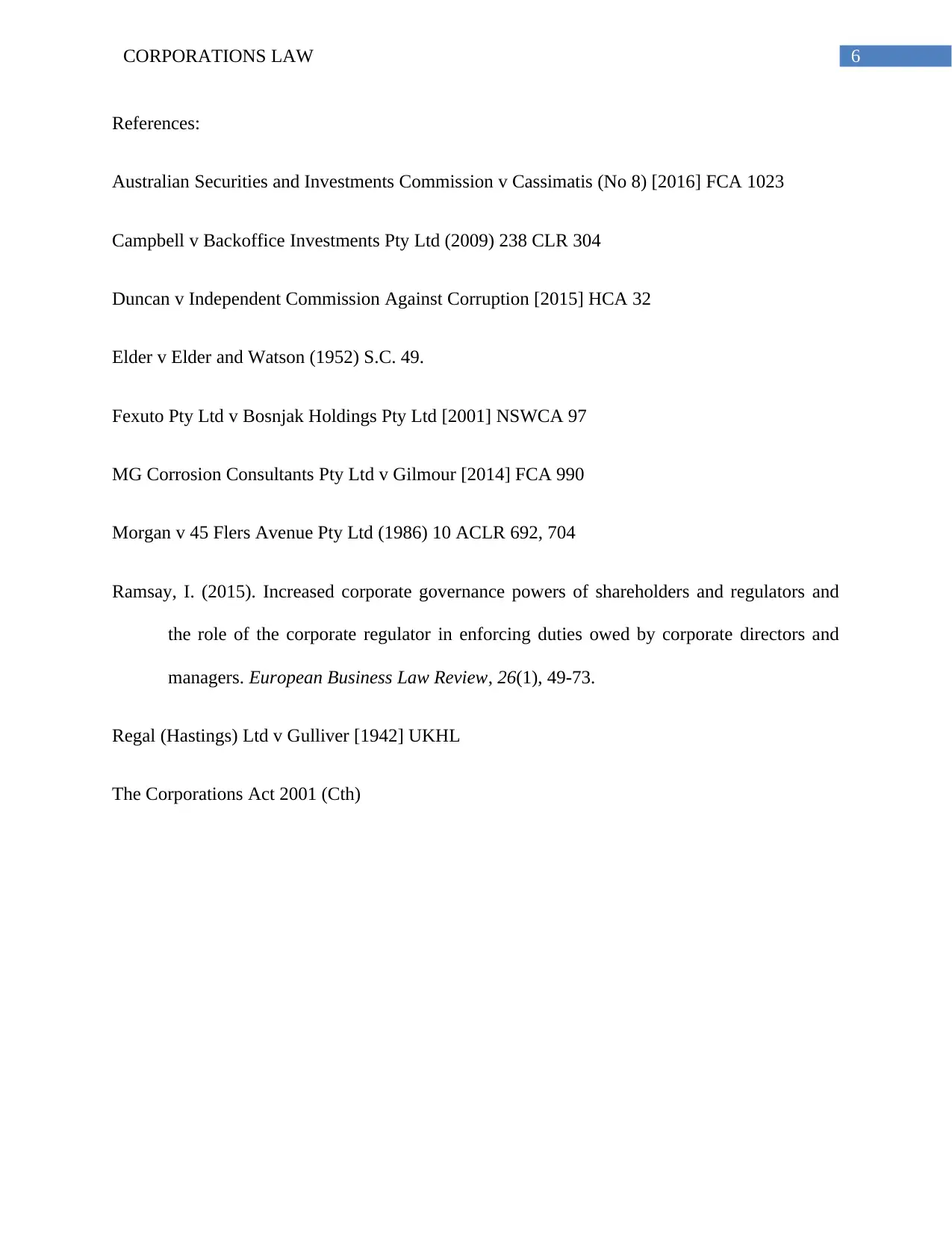
6CORPORATIONS LAW
References:
Australian Securities and Investments Commission v Cassimatis (No 8) [2016] FCA 1023
Campbell v Backoffice Investments Pty Ltd (2009) 238 CLR 304
Duncan v Independent Commission Against Corruption [2015] HCA 32
Elder v Elder and Watson (1952) S.C. 49.
Fexuto Pty Ltd v Bosnjak Holdings Pty Ltd [2001] NSWCA 97
MG Corrosion Consultants Pty Ltd v Gilmour [2014] FCA 990
Morgan v 45 Flers Avenue Pty Ltd (1986) 10 ACLR 692, 704
Ramsay, I. (2015). Increased corporate governance powers of shareholders and regulators and
the role of the corporate regulator in enforcing duties owed by corporate directors and
managers. European Business Law Review, 26(1), 49-73.
Regal (Hastings) Ltd v Gulliver [1942] UKHL
The Corporations Act 2001 (Cth)
References:
Australian Securities and Investments Commission v Cassimatis (No 8) [2016] FCA 1023
Campbell v Backoffice Investments Pty Ltd (2009) 238 CLR 304
Duncan v Independent Commission Against Corruption [2015] HCA 32
Elder v Elder and Watson (1952) S.C. 49.
Fexuto Pty Ltd v Bosnjak Holdings Pty Ltd [2001] NSWCA 97
MG Corrosion Consultants Pty Ltd v Gilmour [2014] FCA 990
Morgan v 45 Flers Avenue Pty Ltd (1986) 10 ACLR 692, 704
Ramsay, I. (2015). Increased corporate governance powers of shareholders and regulators and
the role of the corporate regulator in enforcing duties owed by corporate directors and
managers. European Business Law Review, 26(1), 49-73.
Regal (Hastings) Ltd v Gulliver [1942] UKHL
The Corporations Act 2001 (Cth)
1 out of 7
Related Documents
Your All-in-One AI-Powered Toolkit for Academic Success.
+13062052269
info@desklib.com
Available 24*7 on WhatsApp / Email
![[object Object]](/_next/static/media/star-bottom.7253800d.svg)
Unlock your academic potential
Copyright © 2020–2026 A2Z Services. All Rights Reserved. Developed and managed by ZUCOL.
![Analysis of Asden Developments Pty Ltd v Dinoris (No 3) [2016] FCA 788](/_next/image/?url=https%3A%2F%2Fdesklib.com%2Fmedia%2Fliquidator-breach-of-duties_page_2.jpg&w=256&q=75)




